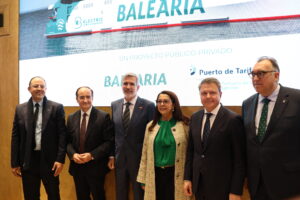Baleària has announced that it is to construct two 100% electric zero-emission fast ferries to operate the first green corridor between Spain and Morocco.
Two zero-emission ferries
In December 2024, Baleària was awarded the tender by the Port Authority of Algeciras Bay (APBA) to manage the Tarifa-Tangier Ville line for the next 15 years. The public-private project includes the construction of two sister ships at Astilleros Armon, as well as the electrification of the ports and the installation of battery recharging systems.
“This is a pioneering and technologically advanced public-private project that will allow us to make the entire journey for the first time using only electric energy and, therefore, with zero emissions,” explained the president of Baleària, Adolfo Utor. “The port authority established the bases for this project that is aligned with our values of innovation and sustainability. We are taking on the challenge of turning the Tarifa-Tangier Ville line into an example of mobility, modernity and international sustainability.”
These two twin catamarans will be built at Astilleros Armon in Gijón over the next two and a half years. Each boat will have an electrical power of 16MW, thanks to four electric propellers powered by batteries, whose capacity of 11,500kWh will enable them to make the entire crossing (29km) with electric propulsion and without emissions.
“These will be fully decarbonized journeys, which will meet the 2050 targets from 2027,” commented Utor, adding that electric propulsion completely eliminates noise and vibrations. Each ship will also have four diesel combustion support generators, with a total capacity of 11,200kW, to cover all contingencies.
The full recharging of the fast ferries’ batteries must be done during the one-hour stopover in each port. To do this, batteries of 8MWh gross each will be installed in both ports, which will be added to the electrical supply on land (5MW in Tarifa and 8MW in Tangier). Charging will be undertaken through two autonomous robotic arms installed in each port, which will be connected to the ship through the OPS (onshore power system) connection. “This innovative system will allow us to recharge the batteries needed for the route in just 40 minutes,” Utor said. Between the onboard and onshore installations, the total capacity of the batteries will be 39 gross MWh (equivalent to around 765 electric cars).
A public-private project
Utor stated that this is “a public-private project, with a Spanish shipping company, shipyard and financier, which also has the participation of national and international companies of reference in the fields of engineering and energy, such as Cotenaval, Endesa, Amendis and Incat Crowther.”
The president of Baleària defined this project as “a green umbilical cord that will unite two countries with a close historical, cultural, economic and commercial relationship”. Utor also pointed out the intention of the shipping company to “turn the Tarifa-Tangier Ville route into a pole of attraction for talent, a focus of development opportunities and a local driving force for the economy and employment”.
The Secretary of State for Transport and Sustainable Mobility, José Antonio Santano, stated that “the decarbonization of transport is one of the ministry’s priorities”. He went on to recognize “the commitment to sustainability and the great effort made by Baleària to promote the decarbonization of its fleet and its commitment to innovation”.
The event also included the presentation of the new transportation system, which will be used to transport the company’s fleet.
In related news, San Francisco Bay Ferry recently purchased the nation’s first three battery-electric, zero-emission high-speed passenger ferries from All American Marine (AAM). Click here to read the full story.


